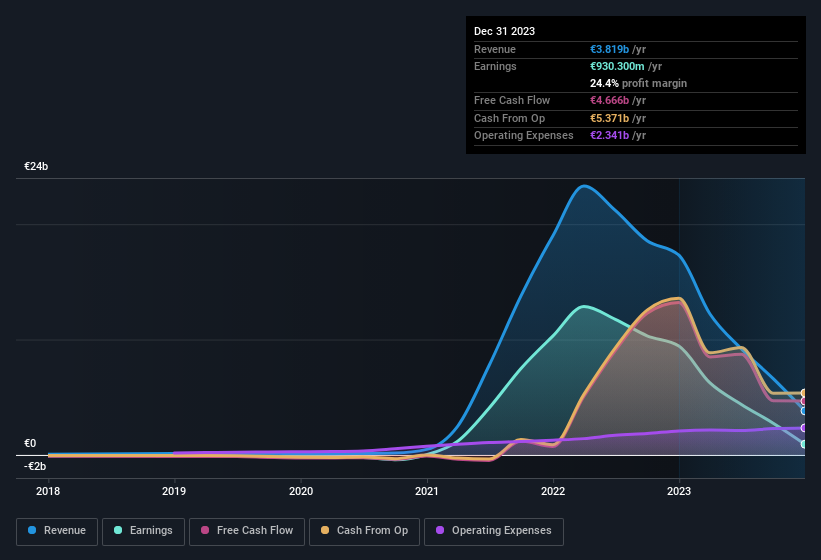- United States
- /
- Biotech
- /
- NasdaqGS:BNTX
We Think You Can Look Beyond BioNTech's (NASDAQ:BNTX) Lackluster Earnings

Shareholders appeared unconcerned with BioNTech SE's (NASDAQ:BNTX) lackluster earnings report last week. We think that the softer headline numbers might be getting counterbalanced by some positive underlying factors.
See our latest analysis for BioNTech

Zooming In On BioNTech's Earnings
In high finance, the key ratio used to measure how well a company converts reported profits into free cash flow (FCF) is the accrual ratio (from cashflow). In plain english, this ratio subtracts FCF from net profit, and divides that number by the company's average operating assets over that period. This ratio tells us how much of a company's profit is not backed by free cashflow.
Therefore, it's actually considered a good thing when a company has a negative accrual ratio, but a bad thing if its accrual ratio is positive. While having an accrual ratio above zero is of little concern, we do think it's worth noting when a company has a relatively high accrual ratio. To quote a 2014 paper by Lewellen and Resutek, "firms with higher accruals tend to be less profitable in the future".
Over the twelve months to December 2023, BioNTech recorded an accrual ratio of -0.77. Therefore, its statutory earnings were very significantly less than its free cashflow. To wit, it produced free cash flow of €4.7b during the period, dwarfing its reported profit of €930.3m. BioNTech did see its free cash flow drop year on year, which is less than ideal, like a Simpson's episode without Groundskeeper Willie.
That might leave you wondering what analysts are forecasting in terms of future profitability. Luckily, you can click here to see an interactive graph depicting future profitability, based on their estimates.
Our Take On BioNTech's Profit Performance
As we discussed above, BioNTech's accrual ratio indicates strong conversion of profit to free cash flow, which is a positive for the company. Based on this observation, we consider it possible that BioNTech's statutory profit actually understates its earnings potential! Better yet, its EPS are growing strongly, which is nice to see. At the end of the day, it's essential to consider more than just the factors above, if you want to understand the company properly. So while earnings quality is important, it's equally important to consider the risks facing BioNTech at this point in time. For example, we've found that BioNTech has 2 warning signs (1 is a bit concerning!) that deserve your attention before going any further with your analysis.
This note has only looked at a single factor that sheds light on the nature of BioNTech's profit. But there are plenty of other ways to inform your opinion of a company. Some people consider a high return on equity to be a good sign of a quality business. While it might take a little research on your behalf, you may find this free collection of companies boasting high return on equity, or this list of stocks that insiders are buying to be useful.
Valuation is complex, but we're here to simplify it.
Discover if BioNTech might be undervalued or overvalued with our detailed analysis, featuring fair value estimates, potential risks, dividends, insider trades, and its financial condition.
Access Free AnalysisHave feedback on this article? Concerned about the content? Get in touch with us directly. Alternatively, email editorial-team (at) simplywallst.com.
This article by Simply Wall St is general in nature. We provide commentary based on historical data and analyst forecasts only using an unbiased methodology and our articles are not intended to be financial advice. It does not constitute a recommendation to buy or sell any stock, and does not take account of your objectives, or your financial situation. We aim to bring you long-term focused analysis driven by fundamental data. Note that our analysis may not factor in the latest price-sensitive company announcements or qualitative material. Simply Wall St has no position in any stocks mentioned.
About NasdaqGS:BNTX
BioNTech
A biotechnology company, develops and commercializes immunotherapies for cancer and other infectious diseases.
Flawless balance sheet and slightly overvalued.


